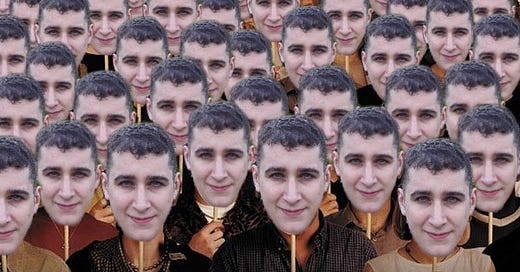The Chronicles of Hanania
Wake up honey, a new anti-woke white nationalist faux public intellectual clone just dropped
The first time I’d ever heard of Richard Hanania was several weeks ago when Substack management sat down for a fawning podcast with him to talk about the Woke Mind Virus or whatever. I didn’t know who that was. Oh it’s the smug teenage-looking alt-right faux academic neo-yuppie white nationalist from Twitter. Okay but just… fuckin’… which one?
These guys all look the same and they all spring up like Beetlejuice whenever someone says racism is bad. But what makes this Hanania character any worse than, say, Glenn Greenwald or any of the other Musk-funded reactionaries pawing through their pantries to throw out any food that looks too woke? Some who were familiar with him, like the journalist Jonathan Katz, seemed to think he was, much worse. I couldn’t find anything he’d said that was particularly damning but then I didn’t have the time or care factor to read all of the seven hundred Tweets he posts per day looking for the swastikas.
Then, weeks later, it dropped. The Huffington Post article. A deep investigation had dug up the fact that Hanania used to write under a pseudonym and his alter-ego’s screeds were pretty damn Hitlery. But I was confused. Wasn’t this already a thing? Why were journalists doing Surprised Pikachu over his Stormfront alt while anyone who was actually familiar with this guy was already shaking pitchforks at the Substack CEO weeks ago?
Hanania, who under a pen name wrote in 2014 of his glowing admiration for Fred Phelps and the Westboro Baptist Church (“Phelps is an alpha at an almost supernatural level,” he cringetacularly says) and spoke of Sarah Palin as a “White Goddess” who “drove the ugly, secular and barren White self-hating and Jewish elite absolutely mad,” today makes bank as a conservative influencer with a more mainstream palatable voice and a political science degree. I don’t think the degree actually matters at all because you can have the education and intellect of a potato (or worse—Ian Miles Cheong) and make it huge as a conservative influencer as long as some of your grunts can be interpreted as the words “two genders.”
The reason he couldn’t hide his membership in the 1488 club is that people just smelled it on him. He reeked of it like Richard Spencer’s cheap cologne. Because all these guys are the same. They look the same, they dress the same, and they have the same Kindle library. Credit to Hanania for not attempting the same “chad stubble” look that all of his metrosexual peers on the right decided to obtain at the exact same time when they simultaneously discovered that they all look like Tom Holland without it.
See, I was wrong when I said I couldn’t find anything damning in Hanania’s recent work. That is, I was telling the truth, but I hadn’t been looking hard enough. Hanania is, like the other goblin clones, entirely without charisma, which is why he does think tanks and podcasts instead of his own Daily Wire show. So you can scroll through his Twitter feed while he drones on and on about university spending and economic statistics and your eyes have already glazed over by the time he slips in that all black people are animals, not just the ones on the subway.
This is why they call it dog-whistling, by the way. You might not hear the sound, but the guy blowing the whistle is surrounded by dogs. The dogs, in this analogy, are people with Roman statue profile pictures and handles like “Renaissance Man” or something containing the number 88 and the letter Æ.
You can listen to the podcast and still come away confused about what this guy is actually famous for. He grew up in Chicago, didn’t know what he wanted to do with his life, thought about becoming a lawyer, changed his mind, studied political science. Absolutely outstanding. I can’t wait for the biopic to win sixteen Oscars. No, he didn’t get famous for being a “political science writer,” he got famous for tweeting relentlessly about borderline phrenological race science and pretending to be an expert on “wokeness” because he has a degree in (don’t dare call it liberal arts) Political Science.
Well I’m sorry, I don’t care how many degrees you have or how many universities have offices with your name on a plaque, if you’re an adult male using “woke” as a noun then I’m assuming you’re about to start ranting about Ethics in Video Game Journalism.
Richard Hanania is not impressive. He is a man of zero genuine accomplishments, whose whole persona arrested at the “first year political science young Republican” stage and never evolved further despite the fact that the man is nearly 40. He describes himself as a bit of a troll, but as a rule of thumb whenever anyone describes themselves as a troll you can mentally substitute the word child.
He released a statement about the whole thing, I’m not going to call it an apology. Hilariously, it’s apparent he knew years ago that he was eventually going to be pressured to apologise for the revelation that he used to love Hitler—in 2019 he wrote an article for the journal Behavioural Public Policy entitled Does apologizing work? An empirical test of the conventional wisdom:
Yet if President Trump's failure to apologize for his statements confounds pundits, this exact same quality is one of the things that endear him to many of his supporters, as, in the words of Rush Limbaugh, “the American people have seen something they haven't seen in a long time, and that is a target stand up and refuse to go away, a target stand up and refuse to apologize” (Rush Limbaugh Show, 2015). The ‘gaffe’ and the ritual apology have indeed become regular staples of our political life. A politician or other prominent individual makes a controversial statement – usually regarding a sensitive topic such as race, gender or the military – and is attacked for it through the media. Conventional wisdom holds that to limit the damage done to the greatest extent possible, the famous figure must show some kind of repentance, engaging in what has become a predictable ‘degradation ritual’ in our public life (Bennett, Reference Bennett1981; Carey, Reference Carey, Curran and Liebes2002; Harris et al., Reference Harris, Grainger and Mullany2006).
While the assumption that apologies help public figures in the midst of controversies is an implicit part of our political culture, it has rarely been tested. Although seeking forgiveness may put one on the path to redemption, it is also possible that it can backfire. Many see strength as an important component of leadership, and apologizing can be perceived as a sign of weakness (Griskevicius et al., Reference Griskevicius2009; Buss, Reference Buss2015, pp. 289–292). This is especially true in cases where observers may feel that the original infraction is ‘no big deal’ or a media-created controversy stirred up by the press or political opponents. Furthermore, some social psychology literature suggests that under certain circumstances the breaking of taboos can be perceived as attractive (de Bruyn & Cillessen, Reference De Bruyn and Cillessen2006). A public figure who apologizes may be seen as following a conventional and safer path, and this may increase the desire of others to punish the individual in question.
Having thoroughly researched how to not apologise to the point of passing something through peer review on the topic, Hanania’s resulting non-apology was well rehearsed (he probably had the damn thing written already, on a USB drive stuffed behind “break in case of competent investigative journalism” glass). His Substack title is Why I Used To Suck, and (Hopefully) No Longer Do, but the Quillette reprinted it—insanely!!—under the title My Journey Out Of Extremism. Like a fucking Hallmark movie. Jesus! Here come those sixteen Oscars. Tom Holland plays every single character.
The views that he initially calls “repulsive” are quickly demoted to simply “embarrassing” (I would also be embarrassed if I called Fred Phelps an Alpha) and the piece just moves right on to dismissing the investigative journalist who exposed him is “antifa” (???) and his fascist persona was an early 20s thing even though he was clearly doing it right up until he was nearly 30.
Then it’s all cancel culture woke woke troll lulz. Buzzword buzzword buzzword.
He knows that this is performative. He’s over there on Twitter openly chuckling about how he can’t believe the suckers at HarperCollins fell for his made up hero journey road to redemption bullshit, before he goes straight back to probing skulls with a craniometer to locate the crime nodules while @JaredTaylor88_ nods sagely in the replies.
These are not interesting people. It’s fascinating to watch people like Hanania, who try to put an intellectual face on the culture of crying about wokeness in Disney movies and ahistorical blackness in fantasy videogames, point to the left and say “NPC” when nobody can tell Chris Rufo from Chris Brunet or Richard Hanania from Richard Spencer. Same guy, different suit, boring ideas. I’m sure his book will do fine, it’ll sit on a special feature table at Barnes and Noble next to Jordan Peterson’s Woke Culture Exposed: Fighting the Mind Virus and Dave Rubin’s Wokesters of Woke: Cancelled By Woke. He’ll smoke a cigar and drink a Scotch on Bill Maher’s shitty man cave podcast.
And then two months from now some guy who looks just like him will pop up and everyone will say “Hey isn’t that--?” But it won’t be. But in another way, it will be.














His youthful indiscretion as he presents it is being too overt with his hatred for black people and women. Can't make it as a right-wing influencer that way.
I still can't believe he's supposed to be a PhD; the fool writes with a crayon. Maybe it's squid-ink for his dumb grass-eater views, but even if it was simon-pure centrism the stink of turgid bilge is all over him.